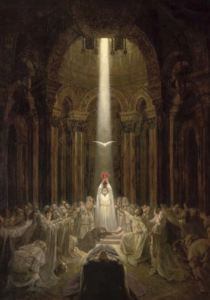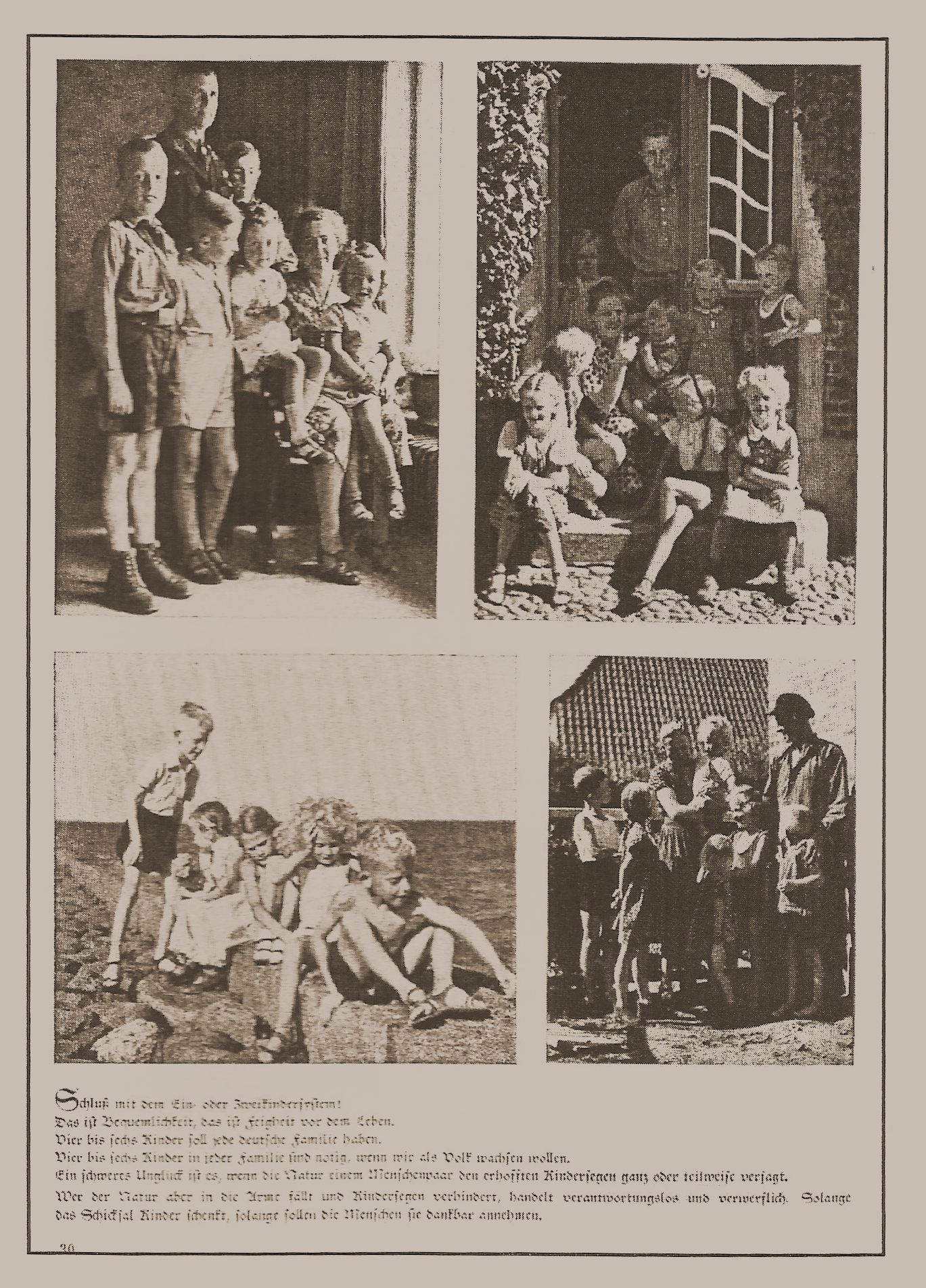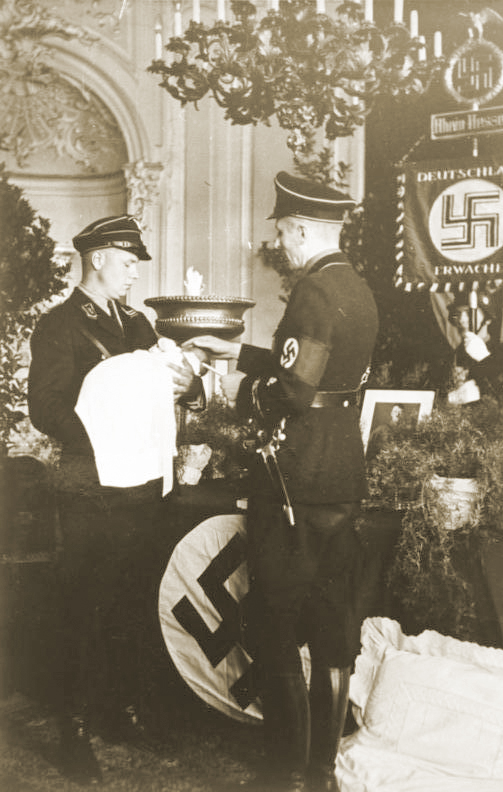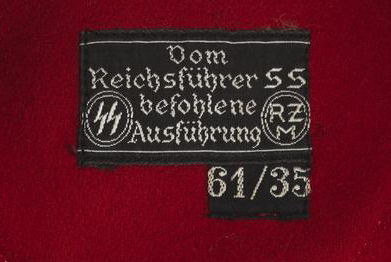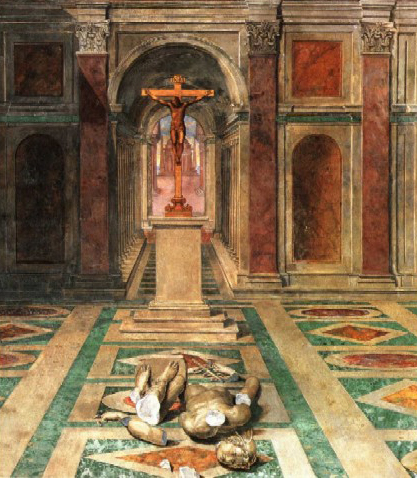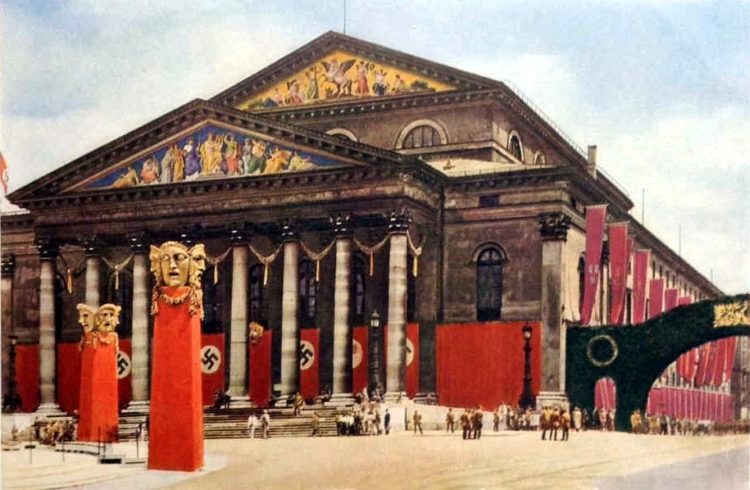But it is above all the constructive aspect of Hitlerism which makes it the elite’s fighting philosophy against levelling—against ‘mass reduction’ (Vermassung)—and the instrument of an in extremis recovery of Aryan humanity and, through it, of all earthly life, against the current of Time.
I have said it over and over again in these talks: there was nothing ‘new’ about the Führer’s ‘New Order’, the one he wanted and which, unfortunately, the pressure of the Dark Forces of the whole world had to crush before his installation. It was the oldest possible order: the ‘original’ order of things, firmly based on the eternal truths which dominate and condition that particular manifestation of Being which is life.
But its resurgence in our late stage of the age of untruths par excellence (and even later) could and never can happen except through combat. This is why the idea of relentless combat, of ‘perpetual revolution’, [1] is inseparable from Hitlerism. It underlies both the most positive creations in all fields and the most implacable defensive measures against the corruption of the race or the regime’s saboteurs.
Hitler’s intolerance is, even in its aggressiveness, only a defensive intolerance—a reaction, as I have tried to show, against the millennial intolerance of Judaism and its ‘jealous God’, and against that of the no less ‘jealous’ entities (‘universalism’, ‘democracy’, etc.) in which an increasingly Judaized world believes. Hitlerism itself is, even in its conquering momentum, nothing but a movement for the defence, protection and resurrection of the fundamental values of Life, denied in the West for centuries. It is the defence of the ideal Order, more or less apparent in the most venerable ancient societies, against all miscegenation, all levelling, all backward selections, all unnatural reversals; against the disintegrating pressure of what is commonly called ‘progress’ and which is, at the bottom, nothing but the ever more insistent affirmation of anthropocentrism. It is, I repeat, unthinkable outside the Dark Ages.
______ 卐 ______
Editor’s note: I would go a little further. Savitri speaks above about ‘the pressure of the Dark Forces’. It is the Christian idea of the human soul that is screwing the Aryan race. As Jack Frost tried unsuccessfully to communicate to Christian commenters in a thread from a Kevin MacDonald article of September 19, 2015:
Christians believe that the soul is eternal and always exists… Now, the soul is raceless and according to them the only important thing about a man; the body is dross, merely a shell. Why should someone who believes he is raceless and never going to die, and who is focused intently on things not of this world but an anticipated next, worry himself about trivial matters such as the survival of Western civilization or of this or that biological race? Clearly, to do so would be a heresy.
______ 卐 ______
When I speak of its ‘constructive aspect’ I don’t especially have in mind the spectacular material, social or even cultural achievements of the German Third Reich: not the restoration of the national economy (almost overnight), not the various initiatives or institutions that might be called ‘philanthropic’, the aid to mothers and children, the distributions of coal to the elderly during the winter, the cruises to the Balearic Islands or the Canary Islands organised for factory workers on paid leave, or the royal four-lane autobahns which ran as far as the eye could see into the splendour of the restored forests. All this was just one of a series of obvious signs of the victorious revolution, a series that was only just beginning.
Other signs, less obvious, more subtle than the first, were already appearing in all areas of life. Newborn babies were increasingly given beautiful Germanic names, evocative of a legendary past. Furniture, at least in some privileged homes, such as those of SS members, was decorated with symbolic motifs whose occult influence was felt even by those who couldn’t explain it. But however important they may have been, they were, again, only signs. This was not the revolution.
The real, positive, creative revolution—unique among the political upheavals of all centuries since antiquity—was the return to the sources, under the command of a qualified Chief and Master: both initiate and strategist, and supreme holder of political authority; prophet of the ‘new’ (or rather eternal) Doctrine and founder of the corresponding visible order; invested, as I said above, with the ‘power of the Two Keys’, elected by those Forces of Life which militate with more and more impersonal fervour, against the fatal tendencies of the Cycle near its end. The real revolution was the effort to restore a traditional society, hierarchically ordered according to the intangible values of all time; resting firmly on the earth while it carried its elite of race, character and knowledge beyond the human, as the plant with long serpentine stems holds its mystic lotuses, hatched in the light, on the surface of the pond, far above the nourishing mud.
The European, if not pan-Aryan society that the Führer wanted was to be no other than this. Politically centred around the Great Reich, that is to say, Germany, supplemented by the conquered areas in the West and especially in the East, would have been dominated by the Germanic elite of the SS, to which would have been increasingly incorporated Aryans of non-German origin, judged worthy of forming, together with their blood brothers, the warrior aristocracy of the new world. And at least part of this young aristocracy would have been—was, in fact, already—a spiritual elite, an initiatory group, linked, through the intermediary of a very ancient tradition, of Germanic expression, to the primordial Tradition.
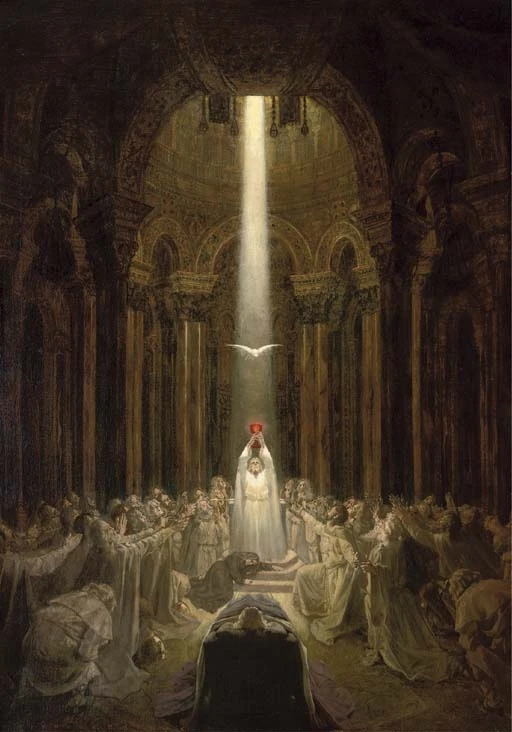 Governed from 1933 onwards by the Incarnation of the divine Liberator, who returns unceasingly and, in the following years, by that of his paladins whom he would have designated, the Reich was to become once again what had been, centuries before Christianity and before Rome, the soil of the old Germanic tribes: a ‘Holy Land’ in the esoteric sense of the word; the cradle of a civilisation nourished by the radiance of a powerful centre of initiatory achievement.
Governed from 1933 onwards by the Incarnation of the divine Liberator, who returns unceasingly and, in the following years, by that of his paladins whom he would have designated, the Reich was to become once again what had been, centuries before Christianity and before Rome, the soil of the old Germanic tribes: a ‘Holy Land’ in the esoteric sense of the word; the cradle of a civilisation nourished by the radiance of a powerful centre of initiatory achievement.
And it is well known that this new Aryan civilisation, with its Germanic elite, was inspired this time by the same principles as the old society of Vedic and post-Vedic India, at a time when the caste system, also based on ‘race and personality’, still corresponded effectively to the natural hierarchy of men. In both cases, at the root of the whole social structure—and, with some exceptions, at the basis of the relations between conquerors and conquered—is the same notion of irreducible congenital inequality between human races, or even between the more or less clear subdivisions of the same fundamental race: an inequality which no religious or philosophical anthropocentrism can attenuate, and which it is the duty of the wise legislator to reinforce, if possible, but never to fight.
The abyss which, in the mind of the Führer, separates the Aryan worthy of the name from the ‘sub-humans’, is reminiscent in more than one respect of the abyss which, in the Sanskrit Scriptures, separates and opposes the Arya, ‘twice born’, from the Dasyu. According to Rauschning, the Führer goes so far as to speak of a ‘new variety of man’, the result of a real ‘mutation’, in the scientific and natural sense of the word[2] which would ‘far surpass present-day man’ and would move further and further away from ‘the man of the herd’, who has already entered, according to him, ‘the stage of decay and survival’.[3]
It seems that he saw this ‘mutation’—which, like the initiation of the ‘twice-born’ of ancient India, or that of the freemen of pagan Greece into the ‘mysteries’, concerned only the race of the masters—as the culmination of a hard series of tests. He felt that it was too late to impose such asceticism on the mature generation. It was the youth, the ‘splendid youth’ that Adolf Hitler loved so much, the youth whose destiny he was still to try to guide ‘in the centuries to come’ by writing his Political Testament under the thunder of the Russian guns, who had to undergo it, and emerge transformed, hardened, embellished, elevated to a higher level of being: a level that an elite within the elite had yet to exceed.
It was in the ‘fortresses’ (Burgs) of the warlike and mystical Order of the SS—those veritable nurseries of Western Kshatriyas—that the masters-at-arms and spiritual masters of the new aristocracy were to educate the young candidates for superhumanity. ‘My pedagogy is hard’, declared the inspired Lawgiver of the new Aryan world. ‘I work with a hammer and loosen everything that is dumb or worm-eaten. In my Burgs of Order we shall grow a youth before whom the world will tremble; a violent, imperious, fearless youth’… a youth who ‘will know how to bear pain. I want nothing weak or tender in them. I want it to have the strength and beauty of the young beasts… the innocence and nobility of Nature’.[4] And further on, still in the same conversation with Rauschning: ‘The only science I shall require of these young people is self-control. They will learn to tame fear. This is the first stage of my Order: the stage of heroic youth. From this will come the second degree: that of the ‘free man’, of the man ‘at the centre of the world’, of the ‘god-man’.[5]
What was this ‘God-man’, this ‘man at the centre of the world’?, the nature of which seems to have completely escaped Rauschning, as no doubt many of the Führer’s other interlocutors. What was it—what could it be—if not what the sages, in the traditional sense of the word, call ‘primordial man’ or ‘Edenic man’: he who has succeeded, precisely through his ‘self-mastery’, in identifying himself with the centre of his being (which is, like that of every being, human or not, the very centre of the manifested world) and who has thereby rediscovered his original innocence, because ‘while acting, he is no longer acts’?[6]
But there was a ‘future stage of manly maturity’, other, higher degrees of initiation of which Adolf Hitler was ‘not allowed to speak’. There were revelations, which were to come ‘later’, ‘long, perhaps, after his death’. He knew that this death—as well as the death, at least apparently, of the whole universe of truth which he was recreating by iron and fire—would be indispensable to the ultimate accomplishment of his mission.
He had had, at the age of sixteen, the extraordinary intuition, I should say: the vision. He seems never to have expressed to anyone the depth of his thinking, nor the magnitude (and horror) of what, from the angle of the ‘eternal Present’, his inner eye could discover of the immediate future of Germany and the world; nor the profound—more than human—reasons which made his fight necessary despite the old certainty and the increasingly obvious prospect of inevitable collapse.
He never expressed any of this because metaphysical knowledge, which alone justified everything he could have said, is, like all such knowledge, incommunicable. Among his most devoted collaborators only those who, like Rudolf Hess, were not aspects of the One Who Comes from the Past, but were nevertheless initiates, could follow him without a leap of faith. These needed no verbal or written transmission to grasp all that in the Führer’s secret thought, though impenetrable to discursive intelligence, was not beyond their level.
_________
[1] Rauschning: Hitler m’a dit, op. cit., page 59.
[2] Ibid., page 272.
[3] Ibid., pages 272-273.
[4] Ibid., page 278.
[5] Ibid., page 279.
[6] The Bhagawad-Gîta, IV, Verse 20.
